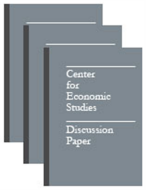The Alpha Beta Gamma of the Labor Market
The Alpha Beta Gamma of the Labor Market
Abstract
Using a large panel dataset of US workers, we calibrate a search-theoretic model of the labor market, where workers are heterogeneous with respect to the parameters governing their employment transitions. We first approximate heterogeneity with a discrete number of latent types, and then calibrate type-specific parameters by matching type-specific moments. Heterogeneity is well approximated by 3 types: αs, βs and γs. Workers of type α find employment quickly because they have large gains from trade, and stick to their jobs because their productivity is similar across jobs. Workers of type γ find employment slowly because they have small gains from trade, and are unlikely to stick to their job because they keep searching for jobs in the right tail of the productivity distribution. During the Great Recession, the magnitude and persistence of aggregate unemployment is caused by γs, who are vulnerable to shocks and, once displaced, they cycle through multiple unemployment spells before finding stable employment.
Others in Series
Working Paper
Working Paper
Working Paper




